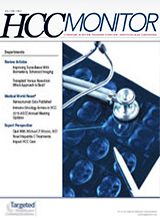Immuno-Oncology Arrives in HCC
The ASCO Annual Meeting is always packed with the latest and greatest advances in the field of oncology, and this year was no exception! The 2015 meeting had posted record-breaking numbers for abstract submissions and attendance, with over 37,000 individuals crowding the halls of the McCormick Place in Chicago.
Mike Hennessy
The ASCO Annual Meeting is always packed with the latest and greatest advances in the field of oncology, and this year was no exception! The 2015 meeting had posted record-breaking numbers for abstract submissions and attendance, with over 37,000 individuals crowding the halls of the McCormick Place in Chicago.
One of the most popular presentations at the meeting focused on the impressive activity of immuno-oncology in hepatocellular carcinoma (HCC). This important study found that the PD-1 inhibitor nivolumab (Opdivo) could effectively shrink tumors for patients with pretreated HCC without inducing substantial side effects.
In this phase I/II study, the 19% prolonged objective response rate (ORR) with nivolumab is encouraging, and offers the potential of a novel treatment modality for HCC. Importantly, nivolumab was effective in patients with viral hepatitis and those with underlying liver cirrhosis, marking an important advance that is desperately needed for patients with limited options.
Exciting data for other novel agents were also presented at the Meeting. Another checkpoint inhibitor, tremelimumab, showed an ORR of 40% in combination with chemoembolization or radiofrequency ablation in pretreated HCC. Additionally, the antibody TRC105 plus sorafenib and axitinib with chemoembolization showed high responses in two separate early phase clinical trials.
While these findings are exciting for patients with advanced disease, the focus remains on early detection and improvements to curative surgical strategies. Additionally, HCC prevention remains an important factor, especially with novel therapies that are revolutionizing the treatment of hepatitis C, according to Michael P. Manns, MD (Click here, to see more from this interview).
With the host of evolving therapies, potential prevention strategies, growing curative options, and improved surveillance modalities, the future for HCC looks bright. I look forward to larger investigations and validation studies as we move closer to eradicating this disease.
Thank you for reading!

Survivorship Care Promotes Evidence-Based Approaches for Quality of Life and Beyond
March 21st 2025Frank J. Penedo, PhD, explains the challenges of survivorship care for patients with cancer and how he implements programs to support patients’ emotional, physical, and practical needs.
Read More